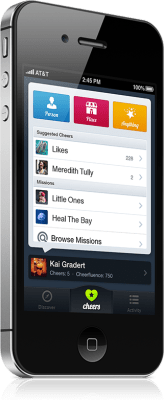Cheers, the app and social network built around giving users the chance to celebrate the good things in their lives, has raised a $2.5 million Series A funding round led by MindFund and including Charles River Ventures, Trinity Ventures, AngelList founder Naval Ravikant and others. The startup launched just over a year ago in February, and is still very much experimenting with its positivity-based social network, according to founder Farhad Mohit.
The funding will help Cheers continue to explore and expand that experiment, Mohit says, and build on recent additions to the platform. This includes the addition of “Celebrations,” a feature introduced in an update a few weeks ago that allows users to build collections that are open to community contribution about any topic. This new feature was designed to address an audience focus issue by giving users ways to find and engage with content they’re specifically interested in, instead of having to wade through the firehose of the general feed.
The Cheers app is similar in concept to apps like Oink, the Kevin Rose project that closed up shop not long after launch after it failed to attract much of an audience. While Mohit admits that the membership numbers aren’t quite where Cheers would like them to be, he still feels the app is now doing something fundamentally different from Oink and others, and addressing a problem that still needs tackling. The key will be continuing to evolve the app’s approach in order to get it to the point where it’s striking a chord with a broader user base.
“If you look at the kinds of decisions that need to be made, there are several layers,” Mohit (who previously founded BizRate) explained. “There’s the purchase layer, when you want to decide whether or not to buy from somebody. For those, BizRate and its ilk were very satisfactory. Then one level above is sort of vendor choice. That’s where Yelp comes in. They [Cheers and Oink] come in at the awareness level – they help you decide whether something is even on your radar to consider.”
Other services in this category have failed because “they failed to realize what this simple text and picture and information is really good for.” They’re not good for comparison, he said. They’re good for generating awareness. Cheers, if it accomplishes its mission, will succeed by enabling a lot of fans and followers of things to create awareness about the people, places and locations that its network members are favoriting, instead of acting as localized, limited-scope comparison tools on the ground around specific locations.
To do that, Cheers hopes to eventually become a funnel for brands looking for sponsored content. The idea is that with Celebrations, brands can curate content from actual users and fans that is positive in nature while at the same time being genuine and spontaneous. It is essentially tailor-made for use in social media campaigns like Facebook promoted stories.
Cheers has a couple of advantages for organizations and groups. It provokes the kind of engagement you can see here in a Celebration called Starbucks, which was started by a user – not anyone associated with the brand. And the network is remarkably good at self-filtering, maintaining an overwhelmingly positive vibe. Mohit says that’s mostly due to the company’s dedicated core users, rather than any direct influence on the part of Cheers or its employees. Brands will soon be able to take advantage of tools designed for organizations on Cheers, Mohit says, which is in part what the funding is designed to help with.
Mohit is surprisingly candid about Cheers and the startup’s chances, saying that this Series A is mostly designed to set the company up to see if there should be a Series B or not. The company has an excellent model for helping organizations turn their biggest fans into a fount of quality user-generated advertising. Now it just needs the user-acquisition strategy to make that happen on a larger scale.
